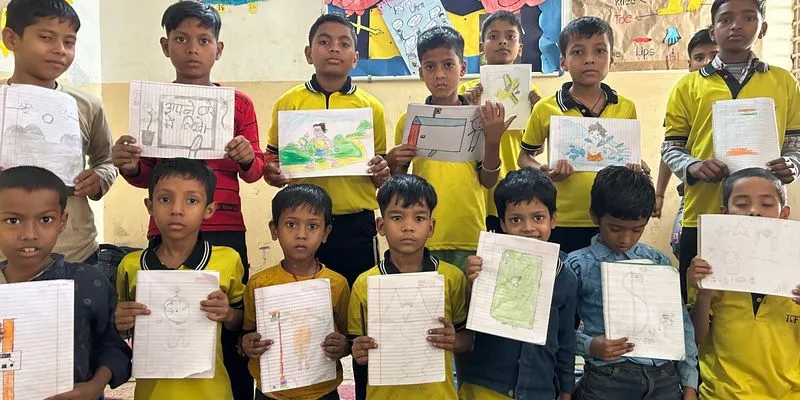How DS Group’s Saamya initiative is fostering gender sensitivity in young boys
Through the Saamya initiative, DS Group is shaping the mindsets of young boys and laying the foundation for a more inclusive and equitable society.
In most Indian households, boys, from a young age, are conditioned to be the ‘man of the house’ and are not expected to do household chores or even help in the kitchen. These gender roles later on exclude boys from understanding the roles of caregivers and homemakers.
Such was the case with Kartik*, a young boy from Mamura village, household chores were something only women did. Akash* too initially struggled with understanding his mother’s daily struggles. All that changed when they joined the Saamya programme.

Young boys part of the Saamya initiative
A session titled “Who Does What” changed Kartik’s perspective, making him realise that caregiving and domestic work are shared responsibilities. Today, he actively helps his mother and sisters, showing greater mutual respect and collaboration at home.
As for Akash, after over four years at Saamya, he has not only learned the value of household responsibilities but has also developed an empathetic approach, ensuring his mother reaches work on time while assisting with daily chores.
The DS Group’s Saamya initiative is redefining gender roles by engaging young boys as allies in the fight for gender equality. It was launched in 2020 with a fundamental understanding: A gender-equitable society cannot be built if young boys are not part of the conversation. Saamya engages boys from an early age (7 to 11 years) to foster values of empathy, respect, dignity, and inclusivity.
“If boys aren’t given the time and opportunity to reflect on the prevalence of gender inequality in our society, they won’t be able to cultivate these values,” says Sunita Gupta, a spokesperson for DS Group. “Through observation, reflection, practice, and action, we can shape a generation of empathetic boys who will bring real change in the future.”
As a result of Saamya’s awareness sessions, Ankit, a dedicated member of the ‘children’s cabinet’ (a group of Saamya passouts) at the Garhi Centre in Noida displayed exceptional courage when he intervened in a case of domestic violence within his home. He sought help from Childline India Foundation and the police, successfully bringing intervention that improved his family’s well-being.
The origins
Saamya’s roots trace back to 2016 when DS Group, which houses FMCG companies, agriculture companies, luxury retail brands, and confectionaries, identified a gap in gender justice programmes: little work was being done with boys, while women and girls continued to be the focus of interventions. After extensive research, Saamya launched in 2020 with pilot programmes in three communities in Noida: Basai Gaon (Sector 70), Garhi Chaukhandi (Sector 121), and Mamura (Sector 66), in collaboration with FXB Suraksha.
Since then, the initiative has expanded to seven locations, including Okhla (Delhi), Lucknow (Uttar Pradesh), and Sheopur (Madhya Pradesh)
Saamya has engaged with over 1,000 boys through its programmes. Over 500 families have actively participated in discussions and activities, and 100+ community leaders and stakeholders have been involved in gender sensitisation initiatives.
Each batch includes 20-30 boys, ensuring focused learning. Boys participate in 18-20 sessions per year over three years. The programme incorporates reflection-based learning rather than textbook education, allowing boys to decide for themselves what is right and wrong.
Through activities like the Consent Wali Holi, where boys created posters and slogans promoting personal boundaries, and exercises in inclusivity such as accepting a peer with dwarfism without discrimination, Saamya aims to instil lifelong values to make them better human beings.
Persistence
One of the biggest challenges Saamya faced was to ensure continuous participation. Many families in slum areas are part of migrant communities, frequently moving for work, which disrupts the boys’ engagement in the programme. Additionally, parents often prioritise academic or vocational skills over social-emotional learning, requiring persistent engagement to help them see the value of raising gender-sensitive boys.
To overcome these challenges, Saamya actively involves families in the process. Parent consent and feedback play a crucial role in the programme’s implementation, ensuring that boys can practice gender-positive behaviours at home.
Over the next five years, Saamya aims to transform the lives of 10,000 young boys across various regions, fostering gender-equitable mindsets. The initiative is set to expand its reach by engaging university students and young professionals, ensuring a broader and more sustained impact. Additionally, the NGO will pursue strategic collaborations with CSR and philanthropic organisations to enhance outreach and drive meaningful change.
“By working together, we can empower more boys to learn and practise gender-positive behaviour, contributing to a society free from injustice—not just for women and girls, but for men and boys themselves,” says Gupta.
(*Some names have been changed to protect their identities.)
Edited by Kanishk Singh






